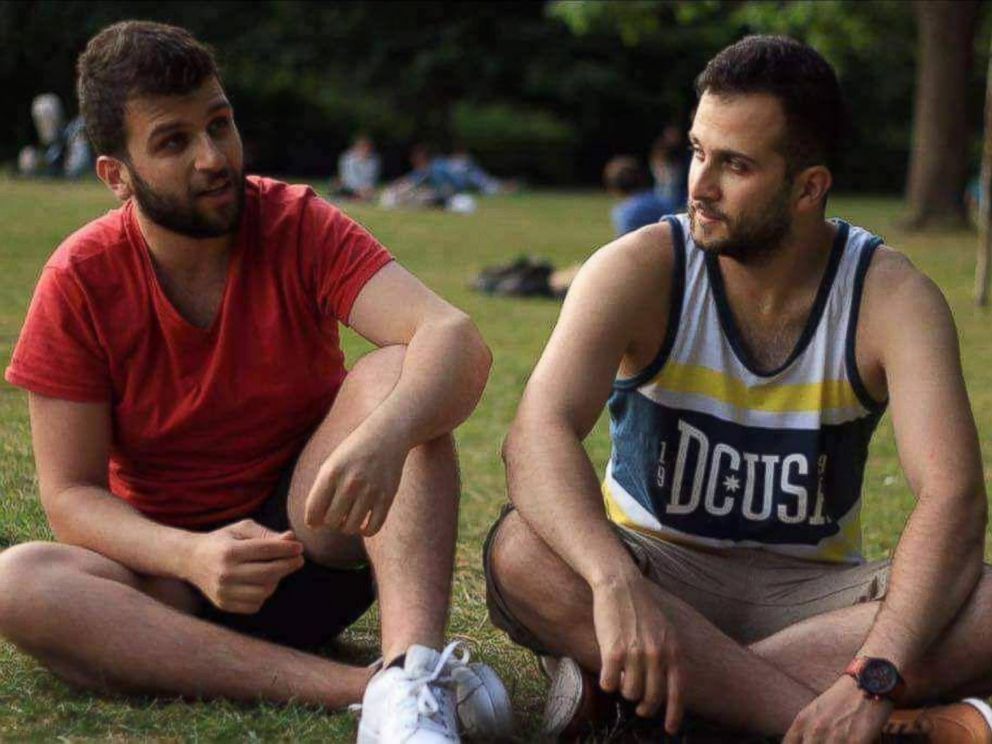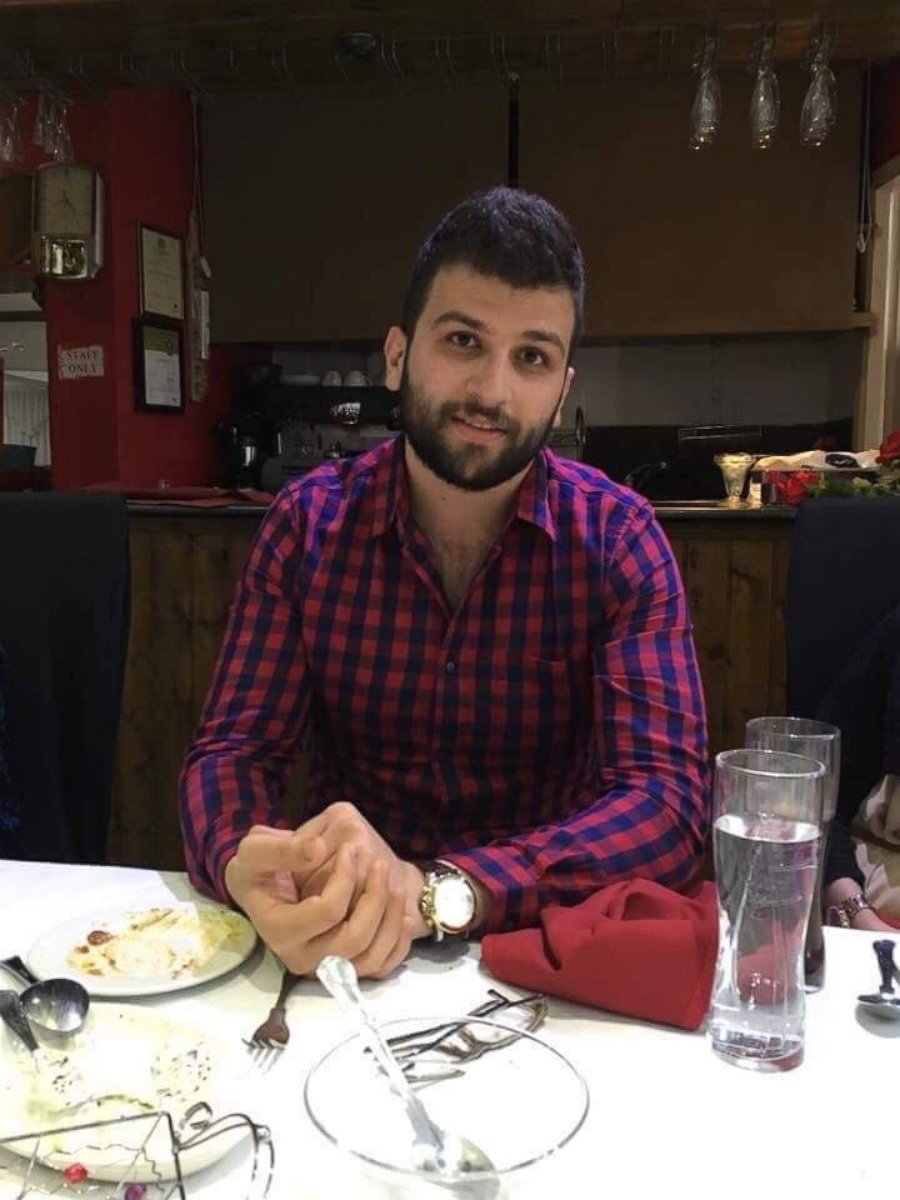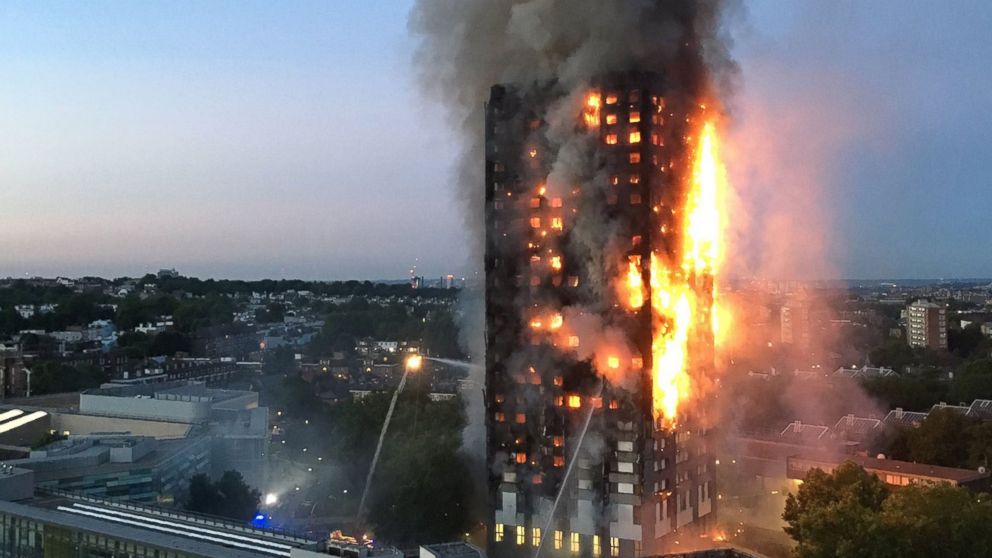Brother of Syrian refugee victim of London fire shares harrowing account
— -- Hashem Alhajali was at home preparing for his exam with a friend when he heard about the deadly fire at the Grenfell Tower in West London. His friend saw the news on Facebook while they were taking a break from the books.
“Look Hashem, there’s a tower burning,” he said. Hashem recognized the building.
“I told him 'this is where my brothers live,'” Hashem, 20, told ABC News. He tried to call his two brothers, Omar and Mohammad, but they didn’t answer the phone.
“I took a taxi. I couldn’t stay,” he said. “I said ‘I have to go, my brothers aren't safe.’”
The three brothers from Daraa, Syria fled their civil war-torn country and moved to London in 2014. Omar and Mohammad moved into an apartment on the 14th floor of Grenfell Tower, the building that caught fire around dawn on Wednesday. The blaze spread quickly and has left at least 58 either confirmed or presumed dead, according to police.
Metropolitan Police Commander Stuart Cundy said on Saturday that the number "may increase" and that the recovery operation is likely to take weeks. Asked during a press conference on Thursday if the death toll could exceed 100, Cundy said, "I'd like to hope that it isn't going to be triple figures."
Hashem lives a 40-minute drive away from the tower. He said he was there at around 3:30 or 4 a.m. on Wednesday.
“I saw the flames eating the building, and then I saw Omar on the floor at the entrance,” he said. “He was crying. He was hardly breathing. He couldn’t lift his body, his hands. His friend was helping him speak on the phone to Hammuda,” Hashem said, using his brother Mohammad’s nickname. Omar had lost his brother on his way out.
“[He] was shouting 'Hammuda, come downstairs.' He was giving him orders: ‘Hammuda come downstairs, come downstairs,’” he said.
But Mohammad said he couldn’t –- that there was some kind of barrier blocking his way and that he was unable to see through the smoke. Hashem was on the phone with Mohammad for about 30 minutes, he said. Mohammad told him two women and a child were with him. At one point he said that the two women had died. He didn’t know what had happened to the child.
“Even if Mohammad would get burned on his hands or legs, he’d come out alive. I didn’t think of Mohammad dying,” his brother said. “I didn’t think of Mohammad dying in such a devastating situation.”
Hashem says that while on the phone, he told Mohammad to lie down on the floor so that he could breathe easier. He spoke to firefighters, and told them Mohammad’s exact location: Apartment 113 on the 14th floor. Hashem said that at one point, he could hear Mohammad sounding happy, even excited, on the phone: “I can feel the water, I can feel the water.”
But then the water stopped, Hashem said. He once more asked the firefighters to spray water in Mohammad’s apartment, and his brother told him that he could feel the water again. Then he said he could hear a helicopter. It sounded like he thought it would save him, Hashem said.

“Isn’t the helicopter spraying water on me?” Mohammad asked his brother. Hashem said yes -– the helicopter would help him and everything would be fine. He told Mohammad to take a towel and to lie down on the floor again. But Mohammad said “I can’t.”
“I thought he meant that he couldn’t breathe,” Hashem said. “He didn’t mean ‘I can’t put a towel.’ He meant ‘I can’t breathe.’”
Then Mohammad started to cry, and said he wanted to speak with their mother, who still lives in Syria. He asked his brother to forgive him, and told him to ask their mother for his forgiveness too. He kept asking to speak to their mother.
“That was the only thing he was asking for,” said Hashem. “He wanted to speak to my mom… and then he just spoke slowly and slowly until he didn’t speak anymore.”
Just before he stopped talking Mohammad told Hashem that the fire broke into the apartment.
"He didn’t seem scared or anxious,” Hashem said. Hashem kept talking to him, telling him to wrap the towel around him, to stay safe.
“I thought he could hear me but he couldn’t. I said ‘listen, answer me Mohammad,' but he didn’t reply to me,” said Hashem.
Hashem tried again and again to call Mohammad, only to reach his voicemail. The next day Hashem looked for Mohammad at London’s hospitals, but he wasn’t there.
“We knew there were many dead, and we felt that Mohammad might be one of those dead, but we always had the hope. We couldn’t believe it,” said Hashem. “We thought Mohammad must be at one of those hospitals even if he is undergoing surgery. Whatever is happening to him, at least he’s alive. He will be alive. He must be alive.”
They found their brother had died when they saw a photo of his body that a man had posted on Facebook. Hashem said that at that point, they felt relief because Mohammad's body didn't appear burned.
“We saw his body and it wasn’t burned so that was good that Mohammad’s body wasn’t burned,” he said.

Mohammad, 23, who was studying civil and environmental engineering at the University of West London, was the first victim of the Grenfell Tower fire to be named. The cause of the fire is still unknown, and Prime Minister Theresa May has ordered a public inquiry into what happened, while London’s Metropolitan Police launched a criminal investigation amid questions and anger about lack of safety precautions at the building.
“Mohammad undertook a dangerous journey to flee war and death in Syria, only to meet it here in the U.K., in his own home,” the Syria Solidarity Campaign, a U.K.-based NGO, said in a statement. “Mohammad came to this country for safety and the U.K. failed to protect him. We absolutely agree that a thorough investigation into Building Regulations should take place immediately.”
The NGO has initiated a petition to try to get Mohammad’s parents a visa so they can attend their son’s funeral.
Hashem said it will still be days before Mohammad’s body is released.
“We’re just waiting for his body,” he said. “We’re waiting for our mom to come and see his body before it’s being buried. We’re waiting to be with our family again. We don’t want to live alone anymore, because life is nothing without your family. If you die with your parents it’s OK, but if you die in a foreign country, even if there are people around you, it’s different.”
He says he wants to bring his parents to the U.K., not just so that they can attend the funeral, but to reunite with the two sons they have left.
“My parents too, they were like… ‘how can he leave us for four years and then not even say goodbye? How can he die?’” Hashem said. “My mom was speaking to me as if I was Mohammad. She was saying ‘why didn’t you go down the stairs? Why didn’t you? You should have because your brother did. You should have gone downstairs as well.’”
“It’s her right to see her son before he gets buried. It’s my family’s right to come and live here, because we live here,” he said. “We lost our beloved brother. He died in a tragic incident in a place where he must be safe.”




